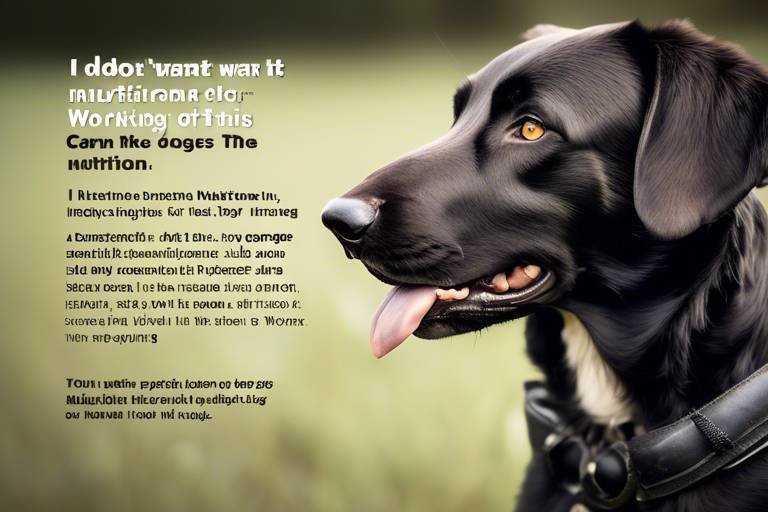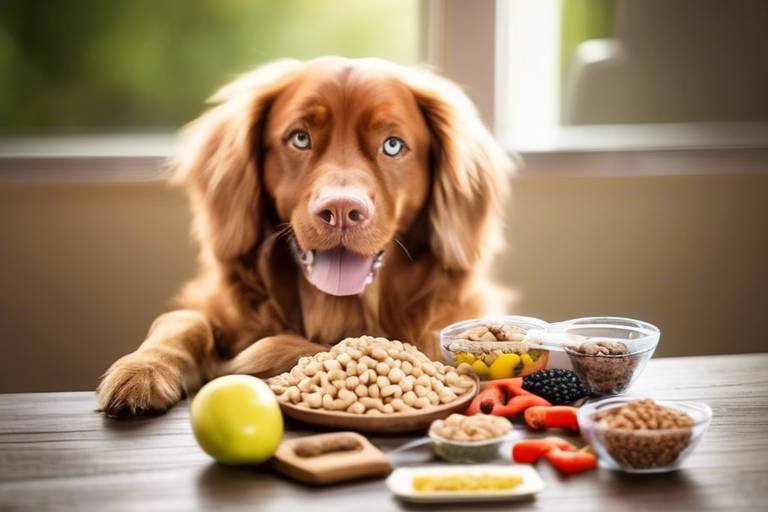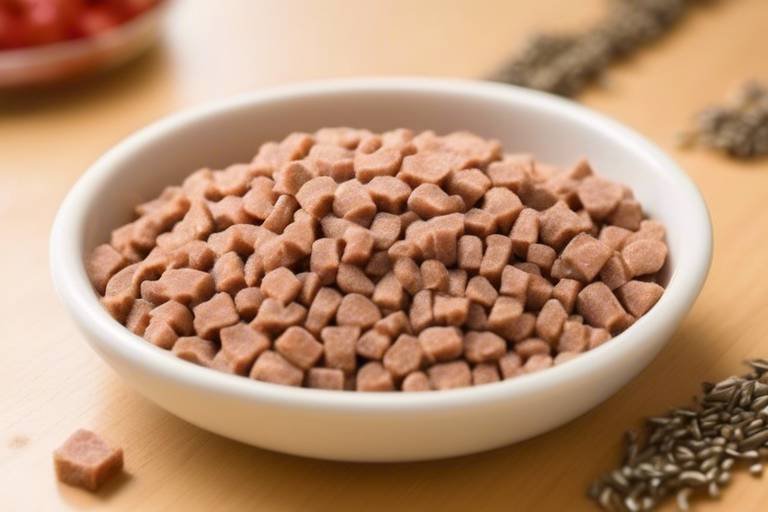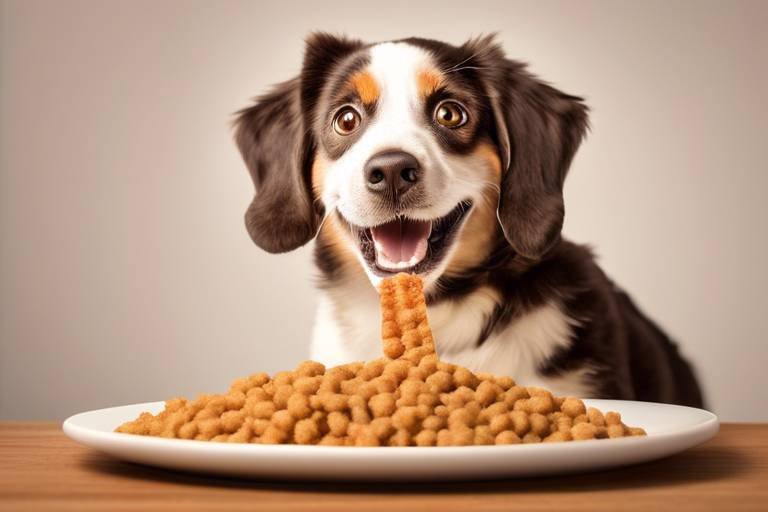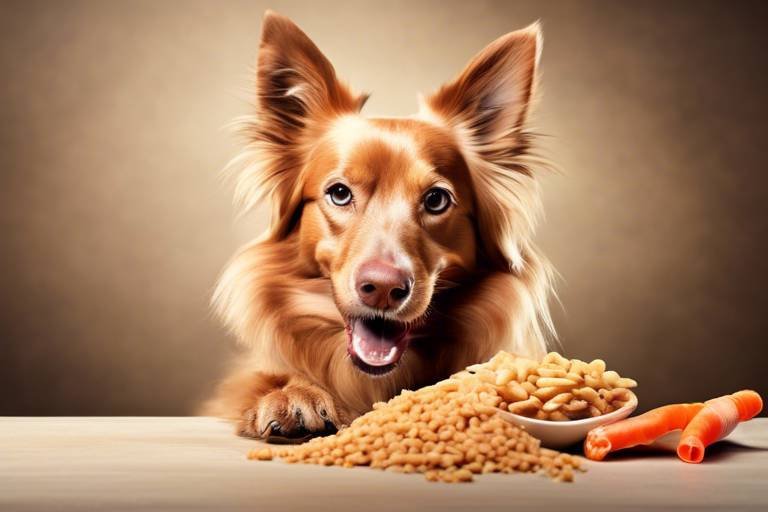The Importance of Micronutrients in Pet Diets
When it comes to our furry friends, we often think about the big picture—like the protein in their food or the tastiness of their treats. But have you ever stopped to consider the micronutrients? These tiny yet mighty components are the unsung heroes of pet nutrition, playing a critical role in keeping our pets healthy, energetic, and happy. Just like humans, pets need a variety of vitamins and minerals to thrive, and the absence of these essential nutrients can lead to a myriad of health issues.
Imagine micronutrients as the tiny gears in a well-oiled machine. If even one gear is missing, the entire system can falter. In the same way, a deficiency in these vital nutrients can disrupt your pet's metabolism, immune function, and overall vitality. Whether it's a playful puppy or a wise old cat, ensuring they receive the right balance of micronutrients is crucial for their growth and longevity.
So, why should you care about micronutrients? Well, just like how we feel sluggish and off when we're not eating a balanced diet, our pets can suffer too. From maintaining a shiny coat to supporting strong bones and teeth, micronutrients are essential for various bodily functions. They help in everything from energy production to the formation of red blood cells. In short, they are foundational to your pet's health.
Moreover, understanding the role of micronutrients can empower you as a pet owner. By recognizing what your pet needs, you can make informed decisions about their diet, ensuring they get the most out of every meal. This article will dive deep into the world of micronutrients, exploring their types, sources, and the consequences of deficiencies. Ready to give your pet the best life possible? Let’s get started!
Micronutrients are essential vitamins and minerals required in small amounts for various bodily functions. Unlike macronutrients that provide energy and support growth, micronutrients are crucial for biochemical reactions in the body. These compounds are vital for maintaining a healthy immune system, promoting growth, and ensuring overall vitality in pets.
In the world of pet nutrition, micronutrients can be categorized into two main groups: vitamins and minerals. Each of these categories contains various types of nutrients that serve specific functions. For example, vitamins are organic compounds that can be broken down by heat, air, or acid, while minerals are inorganic elements that remain intact regardless of the environment. Understanding these differences is essential for providing a balanced diet for your pet.
Let's break down the two main categories of micronutrients: vitamins and minerals. Each of these plays a unique role in your pet's health, and knowing about them can help you make better dietary choices.
Vitamins are organic compounds that are crucial for a variety of metabolic processes. Without them, your pet may experience a range of health issues. Some of the essential vitamins for pets include:
- Vitamin A: Important for vision and immune function.
- Vitamin D: Vital for calcium absorption and bone health.
- Vitamin E: Acts as an antioxidant and supports skin health.
- Vitamin K: Essential for blood clotting.
In the next sections, we'll delve deeper into the types of vitamins and their specific roles in your pet's diet.
Water-soluble vitamins, such as the B-complex vitamins and vitamin C, are vital for energy metabolism and immune function. Unlike fat-soluble vitamins, these need to be consumed regularly as they are not stored in the body. Sources of water-soluble vitamins in pet diets include:
- Meat and fish for B vitamins.
- Fruits and vegetables for vitamin C.
On the other hand, fat-soluble vitamins, including vitamins A, D, E, and K, are stored in the body's fatty tissues and liver. These vitamins play crucial roles in vision, bone health, and blood clotting. Foods such as fish oil, liver, and leafy greens are excellent sources of fat-soluble vitamins.
Minerals are inorganic nutrients that are essential for numerous physiological functions. They are vital for bone formation, nerve function, and muscle contraction. Some essential minerals for pets include:
- Calcium: Necessary for strong bones and teeth.
- Phosphorus: Works with calcium for bone health.
- Iron: Crucial for oxygen transport in the blood.
- Zinc: Supports immune function and skin health.
Providing a balanced diet rich in these micronutrients is crucial for your pet's health. In the next sections, we will discuss the consequences of deficiencies and how to ensure your pet gets the nutrients they need.
Deficiencies in micronutrients can lead to serious health issues in pets. Just like a car needs all its parts to run smoothly, pets require a full spectrum of nutrients to maintain their health. Without adequate micronutrients, your pet may experience various health problems, from weakened immune systems to poor growth.
Recognizing the symptoms of micronutrient deficiencies is essential for timely intervention. Some common signs that indicate a lack of essential nutrients in pets include:
- Fatigue or lethargy
- Skin issues or poor coat condition
- Frequent infections or illnesses
- Bone deformities or dental problems
Chronic deficiencies can lead to severe health problems over time. For instance, a lack of calcium can result in brittle bones, while insufficient iron can lead to anemia. These long-term health impacts can significantly reduce your pet's quality of life and lifespan.
Providing a balanced diet rich in micronutrients is crucial for pet health. Here are some tips to ensure your furry friend gets the nutrients they need:
Selecting high-quality pet food is vital for meeting micronutrient needs. Look for foods that list specific ingredients and provide a complete balance of vitamins and minerals. Always check the labels for the AAFCO (Association of American Feed Control Officials) statement, which ensures the food meets the nutritional standards for pets.
In some cases, dietary supplements may be needed to address deficiencies. Consult your veterinarian before starting any supplements to ensure they are appropriate for your pet's specific needs.
Q: How can I tell if my pet is getting enough micronutrients?
A: Regular veterinary check-ups can help assess your pet's nutritional status. Look for signs of health issues, such as lethargy or poor coat condition, which may indicate deficiencies.
Q: Can I provide micronutrients through homemade pet food?
A: Yes, but it's essential to consult with a veterinarian or a pet nutritionist to ensure that the homemade diet is balanced and meets all of your pet's nutritional needs.
Q: Are there specific foods that are high in micronutrients?
A: Yes, foods like leafy greens, fish, and eggs are rich in various vitamins and minerals. Always aim for a diverse diet to cover all micronutrient bases.

Understanding Micronutrients
Micronutrients are the unsung heroes of pet nutrition, often overlooked but absolutely vital for the overall health and well-being of our furry friends. These essential vitamins and minerals are required in small amounts but play a monumental role in various bodily functions. Think of them as the tiny gears in a complex machine; without them, everything can grind to a halt. Just like humans, pets need these nutrients to thrive, grow, and maintain a robust immune system.
So, what exactly are micronutrients? They can be broadly categorized into two groups: vitamins and minerals. Each of these categories serves unique purposes that contribute to the vitality of your pet. For instance, vitamins are organic compounds that are crucial for metabolic processes, while minerals are inorganic elements that help in everything from bone formation to nerve function. Just imagine trying to run a marathon without the right training—your pet needs these micronutrients to keep their 'running shoes' in top shape!
Micronutrients not only support growth but also help in the prevention of diseases. A well-balanced diet that includes a variety of micronutrients can significantly enhance your pet's quality of life. For example, vitamin A is essential for good vision, while calcium is critical for strong bones. In many cases, pets may not get enough of these nutrients from their regular diets, leading to deficiencies that can have serious health consequences.
It's important to note that while we often think of "more is better," that isn't the case with micronutrients. Too much of certain vitamins and minerals can lead to toxicity, which can be just as harmful as a deficiency. This delicate balance is why understanding and managing your pet's micronutrient intake is so crucial. A well-rounded diet tailored to your pet's specific needs can help ensure they receive the right amounts of these essential nutrients.
In summary, micronutrients are indispensable for maintaining your pet's health. They are the little powerhouses that fuel your pet's body, ensuring everything functions smoothly. By paying attention to what goes into your pet's bowl, you can help them lead a healthier, happier life. Remember, a little knowledge goes a long way in pet care!

Types of Micronutrients
When we talk about micronutrients, we're diving into a world of essential elements that our pets need to thrive. These nutrients are categorized mainly into two groups: vitamins and minerals. Each plays a unique role in maintaining your pet's health, and understanding these categories can help you make informed decisions about their diet.
Vitamins are organic compounds that are crucial for various metabolic processes. They can be further divided into two types: water-soluble and fat-soluble. Water-soluble vitamins, such as the B-complex vitamins and vitamin C, dissolve in water and are typically excreted through urine, which means they need to be consumed regularly. On the other hand, fat-soluble vitamins, like A, D, E, and K, are stored in the body's fatty tissues and liver, making them vital for long-term health.
Minerals, on the other hand, are inorganic elements that also play significant roles in your pet's well-being. They are essential for a variety of physiological functions, including bone formation, nerve function, and muscle contraction. Key minerals include calcium, phosphorus, potassium, and magnesium, each contributing to the overall vitality of your furry friend.
| Micronutrient Type | Examples | Functions |
|---|---|---|
| Vitamins | A, B-complex, C, D, E, K | Metabolic processes, immune function, vision, and blood clotting |
| Minerals | Calcium, Phosphorus, Potassium, Magnesium | Bone health, nerve signaling, muscle function |
It's essential to recognize that while both vitamins and minerals are crucial, they often work in tandem. For instance, calcium and phosphorus must be balanced in your pet's diet to ensure proper bone health. If one is too high or too low, it can lead to a host of problems, including weak bones or even osteoporosis in severe cases. Thus, ensuring your pet's diet is rich in both types of micronutrients is not just important—it's vital for their long-term health.
In conclusion, understanding the types of micronutrients and their specific roles can empower you as a pet owner to provide a well-rounded diet. Whether you're choosing pet food or considering supplements, keeping an eye on these essential nutrients can make all the difference in your pet's vitality and longevity.
Vitamins
Vitamins are like the unsung heroes of your pet's diet, playing crucial roles in metabolic processes and overall health. Just as we need a balanced mix of nutrients to thrive, our furry friends rely on these organic compounds to maintain their vitality and well-being. Without the right vitamins, pets can experience a range of health issues that can affect their quality of life. So, what exactly do these vitamins do?
To start, vitamins can be broadly categorized into two groups: water-soluble and fat-soluble. Water-soluble vitamins, such as the B-complex vitamins and vitamin C, are essential for energy metabolism and immune function. They dissolve in water and need to be replenished regularly since they are not stored in the body. On the other hand, fat-soluble vitamins—like A, D, E, and K—are stored in the body’s fatty tissues and liver, providing a reservoir to draw from when needed.
Let’s delve a bit deeper into the specific roles these vitamins play:
| Vitamin | Role in Pet Health | Sources |
|---|---|---|
| Vitamin A | Essential for vision, immune function, and skin health. | Carrots, sweet potatoes, and liver. |
| Vitamin D | Crucial for calcium absorption and bone health. | Fish liver oils, egg yolks, and fortified pet foods. |
| Vitamin E | Acts as an antioxidant, protecting cells from damage. | Vegetable oils, nuts, and green leafy vegetables. |
| Vitamin K | Important for blood clotting and bone metabolism. | Green leafy vegetables and certain fish. |
| B-Complex Vitamins | Support energy metabolism and nervous system health. | Meat, eggs, and whole grains. |
| Vitamin C | Boosts the immune system and helps with skin health. | Fruits and vegetables, although pets can synthesize it. |
Understanding the roles of these vitamins can help pet owners make informed decisions about their pets' diets. For instance, a deficiency in vitamin A can lead to night blindness and a weakened immune system, while a lack of vitamin D can cause bone malformations. Therefore, ensuring your pet receives a balanced diet rich in these essential vitamins is not just a good idea; it's a necessity for their health.
In summary, vitamins are vital for your pet's health. They contribute to everything from their energy levels to their immune response. By being aware of the importance of these nutrients and incorporating them into your pet’s diet, you can help ensure they lead a happy and healthy life.
Water-Soluble Vitamins
Water-soluble vitamins are a vital part of your pet's diet, playing a significant role in various metabolic processes and overall health. Unlike fat-soluble vitamins, which can be stored in the body's fatty tissues, water-soluble vitamins must be consumed regularly, as they are excreted through urine. This makes it crucial for pet owners to ensure their furry friends are getting enough of these essential nutrients. The primary water-soluble vitamins include the B-complex vitamins and vitamin C, each with unique functions that contribute to your pet's vitality.
The B-complex vitamins, which include B1 (thiamine), B2 (riboflavin), B3 (niacin), B5 (pantothenic acid), B6 (pyridoxine), B7 (biotin), B9 (folate), and B12 (cobalamin), are particularly important for energy metabolism. They help convert food into energy, support brain function, and maintain healthy skin and coat. For instance, thiamine is crucial for nerve function, while B12 is essential for red blood cell formation. A deficiency in any of these vitamins can lead to a range of health issues, from lethargy to severe neurological problems.
Vitamin C, though often associated with human health, is also important for pets, especially for species like dogs and cats. This vitamin acts as a powerful antioxidant, helping to combat oxidative stress and support the immune system. While many pets can synthesize their own vitamin C, certain conditions, such as stress or illness, can increase their requirements. Therefore, ensuring your pet has access to foods rich in vitamin C, like sweet potatoes and carrots, can bolster their health.
To illustrate the importance of water-soluble vitamins in your pet's diet, consider the following table that outlines the key water-soluble vitamins, their sources, and their functions:
| Vitamin | Sources | Functions |
|---|---|---|
| B1 (Thiamine) | Whole grains, meat, fish | Nerve function, energy metabolism |
| B2 (Riboflavin) | Eggs, dairy products, green leafy vegetables | Energy production, skin health |
| B3 (Niacin) | Meat, fish, poultry | Energy metabolism, digestive health |
| B6 (Pyridoxine) | Fish, poultry, potatoes | Amino acid metabolism, neurotransmitter synthesis |
| B12 (Cobalamin) | Meat, fish, dairy | Red blood cell formation, nerve health |
| Vitamin C | Fruits, vegetables | Antioxidant, immune support |
In summary, ensuring your pet receives adequate amounts of water-soluble vitamins is essential for maintaining their health and well-being. A balanced diet that includes a variety of nutrient-rich foods will help keep your pet energetic, healthy, and happy. Always consult with your veterinarian to tailor your pet's diet to their specific needs, especially if you suspect they might be lacking in these vital nutrients.
Fat-Soluble Vitamins
Fat-soluble vitamins are a group of essential nutrients that play a significant role in maintaining your pet's overall health. Unlike their water-soluble counterparts, these vitamins are stored in the body's fatty tissues and liver, making them crucial for various bodily functions. The four primary fat-soluble vitamins are A, D, E, and K, each with unique roles that contribute to your pet's well-being.
Vitamin A is vital for maintaining good vision, particularly in low-light conditions. It also supports a healthy immune system and promotes skin health. Pets that lack Vitamin A may experience issues such as night blindness or dry skin. To ensure your furry friend gets enough Vitamin A, consider incorporating foods rich in this nutrient, such as liver, fish, and certain vegetables like carrots.
Next up is Vitamin D, often referred to as the "sunshine vitamin." While humans can synthesize it through sun exposure, pets typically obtain it from their diet. Vitamin D is essential for calcium absorption, which is crucial for maintaining strong bones and teeth. A deficiency in this vitamin can lead to serious conditions like rickets in young animals or osteoporosis in older pets. Foods like fatty fish and egg yolks are excellent sources of Vitamin D.
Vitamin E is another powerhouse, acting primarily as an antioxidant that protects cells from damage caused by free radicals. This vitamin is essential for maintaining healthy skin and coat, as well as supporting reproductive health. A lack of Vitamin E can lead to muscle degeneration, skin issues, and even fertility problems. You can find Vitamin E in foods like nuts, seeds, and green leafy vegetables.
Lastly, we have Vitamin K, which is crucial for blood clotting and bone health. Without adequate Vitamin K, your pet may face increased bleeding risks or bone-related issues. This vitamin can be found in green leafy vegetables, liver, and certain grains. It's important to note that while fat-soluble vitamins are essential, they can accumulate in the body, and excessive intake can lead to toxicity. Therefore, balancing your pet's diet with the right amounts of these vitamins is key to ensuring their health.
In summary, fat-soluble vitamins are indispensable for your pet's health, supporting everything from vision and bone strength to skin and reproductive health. Ensuring your pet's diet includes these vital nutrients will help maintain their vitality and longevity. Always consult with your veterinarian to determine the best dietary sources and supplements for your furry companion.
- What are fat-soluble vitamins? Fat-soluble vitamins are essential nutrients that are stored in the body's fatty tissues and liver, including Vitamins A, D, E, and K.
- Why are fat-soluble vitamins important for pets? These vitamins play crucial roles in various bodily functions, such as vision, bone health, and immune function.
- How can I ensure my pet gets enough fat-soluble vitamins? Providing a balanced diet rich in these vitamins through high-quality pet food and consulting with a veterinarian for supplementation can help.
- Can fat-soluble vitamins be toxic? Yes, excessive intake of fat-soluble vitamins can lead to toxicity, so it's essential to maintain a balanced diet.
Minerals
Minerals are the unsung heroes of pet nutrition, playing a vital role in a multitude of physiological functions. They serve as the building blocks for strong bones, support metabolic processes, and are crucial for nerve function. Just like how we need a solid foundation to build a house, pets require a proper intake of minerals to maintain their health and vitality. Without these essential nutrients, our furry friends can face a myriad of health issues.
There are two main categories of minerals: macrominerals and microminerals. Macrominerals, such as calcium and phosphorus, are needed in larger amounts, while microminerals, including zinc and iron, are required in trace amounts but are equally important. Let's delve into the specific roles these minerals play in our pets' lives:
| Mineral | Role in Pet Health | Sources |
|---|---|---|
| Calcium | Essential for strong bones and teeth, muscle function, and blood clotting. | Dairy products, leafy greens, and fish. |
| Phosphorus | Works with calcium to build bones and teeth; also important for energy metabolism. | Meat, fish, and eggs. |
| Potassium | Regulates fluid balance, muscle contractions, and nerve signals. | Bananas, sweet potatoes, and spinach. |
| Zinc | Supports immune function, skin health, and wound healing. | Meat, shellfish, and legumes. |
| Iron | Crucial for oxygen transport in the blood and energy production. | Red meat, liver, and beans. |
As you can see, each mineral has its unique function that contributes to the overall health of your pet. It's important to ensure that their diet is well-rounded and includes a variety of these minerals to avoid deficiencies. Just like a well-balanced diet is essential for humans, the same principle applies to our pets. If you think about it, providing your pet with the right minerals is akin to giving them the tools they need to thrive. When they have the right nutrients, they can run, play, and enjoy life to the fullest.
In summary, minerals are crucial for maintaining your pet's health. They not only support essential bodily functions but also contribute to their overall well-being. As a pet owner, understanding the importance of these nutrients helps you make informed decisions about your pet's diet. Remember, a healthy pet is a happy pet!
- What are the signs of mineral deficiency in pets? Common signs include lethargy, poor coat condition, and dental issues.
- Can I use human supplements for my pet? It's best to consult your veterinarian before giving any supplements to ensure they are safe and appropriate.
- How can I ensure my pet gets enough minerals? Provide a balanced diet that includes high-quality pet food and consult your vet about any necessary supplements.

Consequences of Micronutrient Deficiencies
Micronutrient deficiencies in pets can lead to a myriad of health issues that may not be immediately apparent but can significantly impact their quality of life. Just like humans, our furry friends rely on a balanced intake of essential vitamins and minerals to thrive. When these micronutrients are lacking, the consequences can be dire, affecting everything from their immune system to their overall vitality. Imagine trying to run a car without oil; it might function for a while, but eventually, things will start to break down. In the same way, pets deprived of micronutrients may seem okay at first, but the long-term effects can be devastating.
One of the most alarming outcomes of micronutrient deficiencies is a weakened immune system. Pets lacking essential vitamins, such as Vitamin C and Vitamin E, may find themselves more susceptible to infections and diseases. They may also experience slower recovery times from illnesses. Furthermore, deficiencies in minerals like zinc and selenium can hinder the body’s ability to fight off pathogens, leaving your pet vulnerable. It's crucial to recognize that a robust immune system is the foundation of good health, and without it, your pet's quality of life could diminish rapidly.
Moreover, deficiencies can lead to metabolic issues that manifest in various ways. For instance, a lack of B vitamins can result in lethargy, poor appetite, and even neurological problems. Similarly, inadequate calcium and phosphorus can lead to bone issues, particularly in growing puppies and kittens. These minerals are vital for developing strong bones and teeth, and without them, pets may suffer from conditions like rickets or osteoporosis as they age. The body requires a delicate balance of these elements, and even a slight deficiency can tip the scales toward health problems.
In addition to physical symptoms, micronutrient deficiencies can also affect your pet's behavior. Pets that are lacking in essential nutrients may become irritable or lethargic, showing signs of discomfort or distress. For example, a deficiency in Omega-3 fatty acids can lead to skin issues and excessive scratching, which can cause behavioral changes due to discomfort. As pet owners, it's important to be vigilant and recognize that behavioral changes can often be linked back to nutritional deficiencies.
In summary, the consequences of micronutrient deficiencies in pets are far-reaching and can lead to a decline in health and well-being. Regular veterinary check-ups and a balanced diet rich in essential vitamins and minerals are critical for keeping your furry companions healthy. Remember, prevention is always better than cure, and ensuring that your pet receives the right nutrients can safeguard them against serious health issues down the line.
Recognizing the symptoms of micronutrient deficiencies is essential for timely intervention. Here are some common signs to look out for:
- Fatigue and Lethargy: Pets may seem less active or playful.
- Skin Issues: Look for excessive scratching, hair loss, or flaky skin.
- Digestive Problems: Changes in appetite, diarrhea, or vomiting can indicate deficiencies.
- Behavioral Changes: Increased irritability or anxiety may signal nutritional issues.
Chronic deficiencies can lead to severe health problems over time. For instance, prolonged lack of Vitamin A can result in vision problems, while insufficient calcium can lead to skeletal deformities. The long-term effects of insufficient micronutrient intake on pet health can be devastating, leading to conditions that may require extensive veterinary care or even result in a reduced lifespan.
Q: How can I ensure my pet is getting enough micronutrients?
A: The best way to ensure your pet receives adequate micronutrients is to provide a balanced diet that includes high-quality pet food specifically formulated for their age, size, and health needs. Regular veterinary check-ups can also help identify any deficiencies early.
Q: Are supplements necessary for pets?
A: While a well-balanced diet should provide all the necessary nutrients, some pets may require supplements due to specific health conditions or dietary restrictions. Always consult your veterinarian before adding any supplements to your pet's diet.
Q: What are the signs my pet might be deficient in micronutrients?
A: Common signs of micronutrient deficiencies include lethargy, skin issues, digestive problems, and behavioral changes. If you notice any of these symptoms, consult your veterinarian for advice.
Common Deficiency Symptoms
Just like us, pets can experience a range of symptoms when they lack essential micronutrients in their diets. It's crucial for pet owners to be vigilant and recognize these signs early on to prevent more severe health issues down the line. One of the first things you might notice is a change in your pet's energy levels. If your usually playful pup suddenly turns into a couch potato, it might be time to investigate their diet. Low energy can often be linked to deficiencies in key vitamins and minerals that are vital for energy metabolism and overall vitality.
Another common symptom of micronutrient deficiency is a dull or unhealthy coat. Pets with shiny, vibrant fur are usually a sign of good health, while a lackluster coat can indicate a deficiency in essential fatty acids, vitamins, or minerals. Additionally, you might observe changes in your pet's appetite. If they seem disinterested in their food or are eating significantly less than usual, it could be a sign that they are not getting the nutrients they need.
Moreover, gastrointestinal issues such as diarrhea or constipation can also point to nutritional deficiencies. For instance, a lack of certain B vitamins can lead to digestive problems, affecting your pet's ability to absorb nutrients properly. If you notice any of these symptoms, it's important to consult your veterinarian for a thorough examination.
Here are some other common deficiency symptoms to keep an eye out for:
- Weight Loss: Unexplained weight loss can be a red flag, often resulting from poor nutrient absorption.
- Weakened Immune System: Frequent infections or illnesses can indicate a lack of essential vitamins that support immune function.
- Behavioral Changes: Increased irritability or lethargy can be linked to deficiencies in specific nutrients.
In summary, being aware of these common deficiency symptoms can help you ensure your pet remains healthy and happy. Regular check-ups with your vet, along with a balanced diet rich in micronutrients, are essential to prevent these issues from arising.
Q: What are the most common micronutrient deficiencies in pets?
A: Some common deficiencies include Vitamin A, Vitamin D, B vitamins, and essential minerals like zinc and iron. Each of these plays a crucial role in maintaining your pet's overall health.
Q: How can I tell if my pet's food is nutritionally complete?
A: Look for AAFCO (Association of American Feed Control Officials) statements on the packaging. These indicate that the food meets established nutritional standards for pets.
Q: Should I consider supplements for my pet?
A: If you suspect your pet has a deficiency or if they are on a homemade diet, consult your veterinarian about the need for supplements.
Q: Can I give my pet human vitamins?
A: It's not advisable to give your pet human vitamins without consulting a veterinarian, as some human vitamins can be toxic to pets.
Long-Term Health Impacts
When it comes to our furry friends, we often think about their immediate needs—like a warm bed or a tasty treat. However, neglecting micronutrients in their diets can have serious long-term health impacts that may not be immediately apparent. Just like humans, pets require a balanced intake of vitamins and minerals to thrive. Over time, deficiencies can lead to a cascade of health issues that can affect their quality of life and longevity.
For instance, a lack of essential vitamins can lead to weakened immune systems, making pets more susceptible to infections and diseases. Imagine your pet as a fortress; without proper defenses (micronutrients), it becomes vulnerable to invaders (illnesses). Furthermore, chronic deficiencies can manifest in various ways, such as poor coat condition, lethargy, and even behavioral changes. It’s like driving a car with low oil; you might not notice the problem right away, but eventually, it will lead to a breakdown.
One significant long-term effect of inadequate micronutrient intake is the development of chronic conditions. For example:
- Vitamin D Deficiency: This can lead to bone disorders such as rickets, particularly in growing puppies and kittens.
- Vitamin A Deficiency: This can result in vision problems and skin issues, affecting overall vitality.
- Calcium Deficiency: This can lead to dental problems and skeletal issues, which may require costly veterinary interventions.
Moreover, the long-term impacts can extend beyond physical health. Pets suffering from chronic deficiencies may experience emotional distress as their bodies struggle to function properly. Imagine feeling tired and sluggish all the time; it would make anyone irritable and less playful. Pets, too, can become less engaged and more withdrawn, affecting their relationships with their human companions.
It's crucial to recognize that these long-term health impacts are often preventable with proper nutrition. Regular veterinary check-ups and a balanced diet rich in micronutrients can help ensure that your pet leads a healthy, vibrant life. Investing time in understanding your pet's nutritional needs is not just a responsibility; it’s a commitment to their well-being that pays off in the form of a happy, healthy companion.
Q: How can I tell if my pet is lacking micronutrients?
A: Look for signs such as dull fur, lethargy, frequent illnesses, or behavioral changes. If you notice these symptoms, consult your veterinarian for a thorough assessment.
Q: Are homemade diets sufficient for my pet's micronutrient needs?
A: While homemade diets can be nutritious, they often lack the balance of vitamins and minerals found in commercial pet foods. It's essential to work with a veterinarian or a pet nutritionist to ensure your homemade meals meet all of your pet's nutritional needs.
Q: Can I give my pet human vitamins?
A: Not all human vitamins are safe for pets. Some can be toxic. Always consult your veterinarian before introducing any supplements to your pet’s diet.
Q: How often should I have my pet’s diet evaluated?
A: It’s a good idea to have your pet’s diet evaluated at least once a year during their routine veterinary check-up. This ensures they are getting the necessary nutrients for their age, size, and health status.

Ensuring Adequate Micronutrient Intake
When it comes to our furry friends, ensuring they receive adequate micronutrients is not just a matter of good practice; it's essential for their health and happiness. Think of micronutrients as the tiny superheroes of your pet's diet, working tirelessly behind the scenes to support everything from their immune system to their energy levels. So, how can you make sure your pet is getting all the nutrients they need? Let’s dive into some practical tips and strategies!
First and foremost, choosing quality pet food is paramount. Not all pet foods are created equal, and the label can tell you a lot about the nutritional value of the product. Look for brands that list whole food ingredients and are formulated to meet the specific needs of your pet's age, size, and activity level. High-quality pet food should contain a balanced mix of proteins, fats, and carbohydrates, along with vitamins and minerals. If you're unsure where to start, consider consulting with a veterinarian who can recommend reputable brands that align with your pet's dietary requirements.
In addition to selecting the right food, it's also important to keep an eye on your pet's overall diet. Just like humans, pets can benefit from a variety of foods. Incorporating fresh fruits and vegetables can enhance their diet and provide additional vitamins and minerals. For instance, carrots are great for vision health, while blueberries are packed with antioxidants. Just be sure to research which foods are safe for your pets, as some human foods can be harmful.
Sometimes, despite our best efforts, pets may still lack certain nutrients. In such cases, supplementing when necessary might be the way to go. However, before you start tossing in supplements like candy, it’s crucial to consult with a veterinarian. They can help identify any deficiencies and recommend appropriate supplements tailored to your pet's specific needs. Remember, too much of a good thing can be harmful, so moderation is key!
To provide a clearer picture of what a balanced diet looks like, here's a quick table summarizing some essential vitamins and minerals, their sources, and their roles in pet health:
| Micronutrient | Sources | Role in Pet Health |
|---|---|---|
| Vitamin A | Carrots, sweet potatoes, liver | Supports vision and immune function |
| Vitamin D | Fish liver oil, egg yolks | Essential for bone health and calcium absorption |
| Calcium | Bone meal, dairy products | Important for strong bones and teeth |
| Iron | Meat, leafy greens | Crucial for oxygen transport in the blood |
By keeping these considerations in mind, you can help ensure that your pet receives a well-rounded diet rich in essential micronutrients. A little attention to detail can go a long way in promoting optimal health and longevity for your beloved companion. After all, a happy pet is a healthy pet!
Q: What are micronutrients, and why are they important for my pet?
A: Micronutrients are vitamins and minerals that are required in small amounts for various bodily functions. They are crucial for maintaining your pet's health, supporting immune function, and ensuring optimal growth.
Q: How can I tell if my pet is getting enough micronutrients?
A: Look for signs of good health, such as a shiny coat, healthy skin, and high energy levels. If you notice any changes in behavior or health, consult your veterinarian.
Q: Is it safe to give my pet vitamin supplements?
A: While some pets may benefit from supplements, it's essential to consult with a veterinarian first. Over-supplementation can lead to health issues, so always follow professional advice.
Q: Can I feed my pet human food for additional nutrients?
A: Yes, but be cautious! Some human foods are safe and nutritious for pets, while others can be harmful. Always research which foods are safe before sharing your meals.
Choosing Quality Pet Food
When it comes to selecting the right food for your furry friend, quality matters more than you might think. Just like humans, pets require a balanced diet that encompasses all the essential micronutrients necessary for their health and vitality. With so many options on the market, how do you choose the best one? The key lies in understanding what to look for on those pet food labels, and knowing how to navigate through the sea of marketing jargon that often clouds your judgment.
First and foremost, always check for high-quality ingredients. The first few ingredients listed on the label should ideally be whole meats or meat meals, as these are the primary sources of protein your pet needs. Ingredients like chicken, beef, or fish should be at the top of the list. Avoid foods that list vague terms like "meat by-products" or "animal fat," as these can be low-quality sources of protein that do not provide the necessary nutrients your pet requires.
Next, consider the presence of whole grains or vegetables in the formula. Ingredients such as brown rice, oats, or sweet potatoes can be excellent sources of energy and fiber. However, keep in mind that some pets may have sensitivities to grains, so it's essential to monitor your pet's reaction to their food. If you notice any digestive issues, it might be worth exploring grain-free options.
Another vital aspect to consider is the inclusion of vitamins and minerals. Look for pet foods that are fortified with essential micronutrients. These should include vitamins A, D, E, and various B vitamins, which play critical roles in your pet's metabolism and overall health. Additionally, minerals like calcium, phosphorus, and zinc are crucial for bone health, immune function, and skin integrity.
To make the best choice, it's also a good idea to consult with your veterinarian. They can provide personalized recommendations based on your pet's age, breed, size, and any specific health concerns. This tailored advice can be invaluable in ensuring that your pet receives the right balance of nutrients.
Lastly, don't forget to consider the brand's reputation. Research the manufacturer and check for any recalls or safety issues they may have had in the past. A company that prioritizes quality and transparency will often provide detailed information about their sourcing and manufacturing processes. You can also look for brands that have undergone feeding trials, which can provide additional assurance of their product's quality.
In summary, choosing quality pet food is not just about picking the most colorful bag on the shelf; it's about understanding what goes into your pet's diet. By focusing on high-quality ingredients, ensuring the presence of essential micronutrients, and seeking professional advice, you can make an informed decision that supports your pet's health and happiness for years to come.
- What should I look for in a pet food label? Look for high-quality protein sources, whole grains or vegetables, and a balance of vitamins and minerals.
- Is grain-free food better for my pet? Not necessarily. Some pets can benefit from grains, while others may have sensitivities. Consult your vet for personalized advice.
- How can I tell if my pet is getting enough micronutrients? Monitor their overall health, energy levels, and coat condition. If you notice any changes, consult your veterinarian.
- Are there any brands you recommend? It's best to research brands and consult with your vet for recommendations tailored to your pet's needs.
Supplementing When Necessary
When it comes to our furry friends, ensuring they receive adequate micronutrients is crucial for their health and happiness. Sometimes, despite our best efforts, their diets may not provide all the essential vitamins and minerals they need. This is where supplementation can play a vital role. But how do you know when it's necessary to supplement your pet's diet?
First and foremost, it's important to recognize that not all pets require supplements. A balanced, high-quality diet can often meet their nutritional needs. However, certain situations may warrant the addition of micronutrients. For instance, pets with specific health conditions, those recovering from surgery, or even senior pets may benefit from extra support. Additionally, if you’re feeding a homemade diet, it can be challenging to ensure your pet gets all the necessary nutrients without a little help.
Before diving into supplements, it’s essential to consult with a veterinarian. They can assess your pet's diet and health status, determining whether supplementation is necessary. If your vet recommends adding supplements, they’ll likely suggest specific products based on your pet’s age, weight, and health condition.
When selecting supplements, quality is paramount. Look for products that are vet-approved and made from high-quality ingredients. Avoid those with fillers or artificial additives, as these can do more harm than good. Additionally, be cautious about the dosage; just because a little is good doesn’t mean a lot is better! Over-supplementation can lead to toxicity and other health issues.
Here are some common types of supplements that might be beneficial for pets:
- Multivitamins: These can help fill in the gaps in your pet's diet, providing a broad spectrum of vitamins and minerals.
- Omega-3 Fatty Acids: Great for skin health, coat shine, and reducing inflammation, these are particularly useful for pets with allergies or joint issues.
- Probiotics: These support digestive health and can be especially helpful after your pet has been on antibiotics.
In conclusion, while a balanced diet is the foundation of your pet's health, there are times when supplementation is necessary. By working closely with your veterinarian and choosing high-quality products, you can ensure that your pet receives the optimal nutrition they need to thrive. Remember, just like us, our pets can have unique nutritional needs, so staying informed and proactive is key!
1. How do I know if my pet needs supplements?
Consulting with your veterinarian is the best way to assess your pet's nutritional needs. They can evaluate your pet's diet and health to determine if supplements are necessary.
2. Can I give my pet human vitamins?
No, human vitamins can be harmful to pets. Always use supplements specifically formulated for pets to avoid potential toxicity.
3. How can I ensure the quality of pet supplements?
Look for products that are vet-approved, made from high-quality ingredients, and free from fillers or artificial additives. Research brands and read reviews before purchasing.
4. Are there any risks associated with pet supplementation?
Yes, over-supplementation can lead to toxicity and other health issues. Always follow your veterinarian's recommendations regarding dosage and duration of supplementation.
Frequently Asked Questions
- What are micronutrients and why are they important for pets?
Micronutrients are essential vitamins and minerals that pets need in small amounts to maintain their health. They play a crucial role in various bodily functions, including growth, immune response, and overall vitality. Just like humans, pets require these nutrients to thrive and lead a happy, active life.
- What types of micronutrients should I be aware of for my pet?
There are two main categories of micronutrients: vitamins and minerals. Vitamins can be further divided into water-soluble (like B-complex and C) and fat-soluble (such as A, D, E, and K). Each type has specific roles, such as supporting energy metabolism, vision, and bone health. Minerals, on the other hand, are vital for physiological functions like muscle contraction and nerve transmission.
- How can I tell if my pet has a micronutrient deficiency?
Common signs of micronutrient deficiencies in pets include lethargy, poor coat condition, and frequent infections. If you notice any unusual behavior or symptoms, it’s essential to consult your veterinarian. They can help determine if a deficiency is present and recommend appropriate dietary changes or supplements.
- What are the long-term effects of micronutrient deficiencies?
Chronic deficiencies can lead to severe health issues over time, such as weakened immune systems, developmental problems, and even organ failure. Ensuring that your pet receives adequate micronutrients is crucial for their longevity and quality of life.
- How can I ensure my pet gets enough micronutrients?
Providing a balanced diet rich in micronutrients is key. Look for high-quality pet food that lists essential vitamins and minerals in the ingredients. If your pet has specific dietary needs or restrictions, consider discussing supplementation options with your veterinarian to fill any gaps.
- Are there specific pet foods you recommend for optimal micronutrient intake?
While there are many quality pet foods available, it’s essential to choose one that meets the nutritional standards set by organizations like AAFCO. Look for products that contain whole food ingredients and avoid those with excessive fillers. Your vet can also provide personalized recommendations based on your pet's health and dietary needs.
- When should I consider supplementing my pet's diet?
Supplementation may be necessary if your pet is on a restricted diet, has specific health concerns, or shows signs of deficiencies. However, it's crucial to consult with a veterinarian before adding any supplements to ensure they are safe and appropriate for your pet's unique needs.



